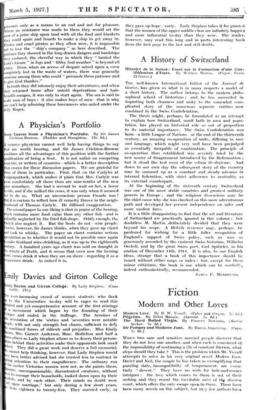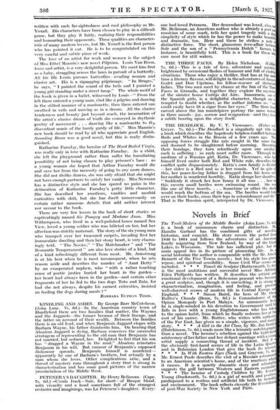Fiction
Modern and Other Loves
Sir Pompey and Madame Juno. By Marlin Armstrong. (Cape. 7s. tld.) WHEN two sane and sensitive married people discover that they do not love one another, and when each is convinced of the impossibility of continuing a life of constant friction, what steps should they take ? This is the problem which Mr. Yoxall attempts to solve in his very original novel Modern Love: Dariel 'and Neil, the couple he has taken as exemplifying that puzzling state, incompatibility of temperament, are essen- tially " decent." They have no wish for hole-and-corner intrigues : the love which comes to them is not of their seeking and they resent the inevitable mire of the divorce court, which offers the only escape opea to them. There have been many novels on this subject, but yr,' few authors have
written with such far-sightedness and cool philosophy as Mr. Yoxall. His characters have been chosen to play in a difficult game, but they play it fairly, realizing their responsibilities and honouring their opponents. These qualities are character- istic of many modern lovers, but Mr. Yoxall is the first person who has pointed it out. He is to be congratulated on this very careful and subtle piece of work.
The love of an artist for work and women is the subject of Miss Ethel Mannin's new novel Pilgrims. Louis Van Roon, lover and artist, is a very delightful person. We meet him first as a baby, struggling across the lawrein pursuit of a butterfly. All his life Louis pursues butterflies—evading women and elusive art. His is a zigzagging pilgrimage. " In Bruges," he says, " I painted the sound of the bells and I painted a young girl standing under a street lamp." The whole motif of the book is given in a ballet, witnessed by Louis—" From the left there entered a young man, clad like a pilgrim and dancing in the stilted manner of a marionette, then there entered one swathed in veils and moving as in a dream. All the elusive tenderness and beauty just beyond reach, the incarnation of the artist's elusive dream of truth she conveyed in rhythmic poetry of movement . . . dancing like a marionette to the discordant music of the hurdy gurdy of life." Miss Mannin's new book should he read by all who appreciate good English. Sounding Brass was a good novel, but this is really distin- guished.
Katharine Faraday, the heroine of The Hard Boiled Virgin, was really only in love with Katharine Faraday. As a child, she left the playground rather than suffer the humiliating possibility of not being chosen to play prisoner's base : as a young woman she hoped that Arthur Faraday would die and save her from the necessity of going to any more dances. She did not dislike dances, she was only afraid that she might not have enough partners to satisfy her vanity. Miss Newman has a distinctive style and she has spared no pains in the delineation of Katharine Faraday's petty little character. She has described her emotions, vanities and morbid curiosities with skill, but she has dwelt unnecessarily on certain rather nauseous details that add neither interest nor savour to the book.
There are very few lovers in the book of short stories so captivatingly named Sir Pompey and Madame Juno. Miss Witherspoon, who lived in a well-polished house named Sea View, loved a young soldier who was billeted on her, but her affection was strictly maternal. The story of the six young men who tramped over her treasured carpets, invading first her immaculate dwelling and then her stony heart, is very charm- ingly told. " The Novice," " The Matchmaker " and " The Romantic Temperament " are also love stories of a kind, but of a kind refreshingly different from most. Mr. Armstrong is at his best when he is most inconsequent, when he sets reason aside and describes the murder of " Aunt Betty " by an exasperated nephew, who " with a rather touching sense of poetic justice buried her heart in the garden- ber heart had always been in the garden—and certain other fragments of her he fed to the two dogs Toto and Zulu, for had she not always, despite his earnest entreaties, insisted on feeding the dogs during meals ? "
BARBARA EUPDAN TODD.































































 Previous page
Previous page